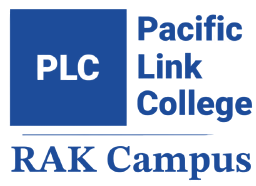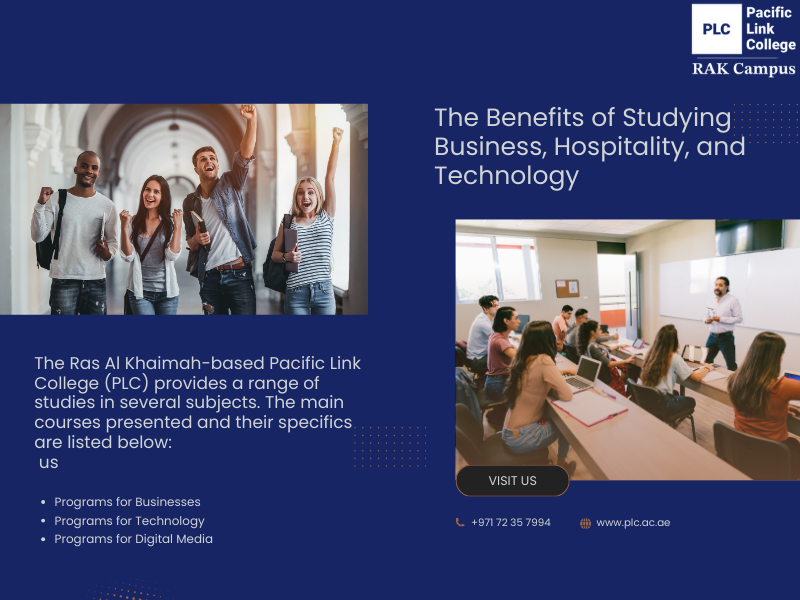Career Opportunities and Growth
Gaining knowledge in technology, hospitality, and business can lead to a variety of job options and prospects for advancement. The U.S. Bureau of Labor Statistics projects that by 2026, there will be 773,800 new employment in business and financial capacity, demonstrating the continued high demand in the business and hospitality industries. Furthermore, it is anticipated that the global hospitality sector would expand between 2022 and 2025 at a steady 7% annual growth rate, pointing to a robust and steady labor market. You can set yourself up for success in a number of occupations, from entrepreneurship and financial analysis to hotel management and event planning, by developing abilities in these areas.
The Ras Al Khaimah-based Pacific Link College (PLC) provides a range of studies in several subjects. The main courses presented and their specifics are listed below:
Programs for Businesses
Business diploma: The core business concepts covered in this curriculum include marketing, finance, and management. Students who complete it are prepared for entry-level jobs in a variety of business fields.
Advanced Business Diploma: This curriculum expands on the diploma by exploring advanced marketing tactics, international business, and strategic management in greater detail.
Post Graduate Diploma in Business: Designed for recent graduates, this program prepares students for managerial positions by covering advanced business tactics, entrepreneurship, and leadership.
Programs for Technology
Information technology basics, such as database management, network administration, and programming, are covered in this diploma program.
Expanding upon the certificate, the Advanced certificate in Information Technology course covers advanced IT subjects like cloud computing, advanced programming, and cybersecurity.
Postgraduate Information Technology Diploma: This curriculum, which is intended for IT graduates, focuses on IT project management, new technologies, and advanced IT management.
Programs for Digital Media
The foundations of digital media creation, such as graphic design, video production, and multimedia storytelling, are covered in the diploma program in digital media.
Advanced Digital Media Diploma: This curriculum, which is an extension of the diploma, covers advanced subjects like interactive media, digital marketing, and sophisticated graphic design.
Post Graduate Diploma in Digital Media: Designed with graduates in mind, this program places a strong emphasis on digital media strategy, sophisticated production methods, and leadership.
Global Networking and Industry Connections
Gaining access to a global network of classmates, instructors, and business experts is a common perk of studying technology, hospitality, and business. Numerous programs offer opportunities for cultural immersion, language acquisition, and networking with people from other backgrounds, particularly those that have an international focus. These relationships may open doors to internships, employment, and joint ventures across borders and industries, providing you a competitive advantage in the world economy.
Innovative Thinking and Problem-Solving Abilities
The dynamic nature of technology, business, and hospitality demands the capacity for critical thought, change adaptation, and creative problem-solving. Your coursework in these subjects will help you develop your problem-solving abilities by pushing you to consider problems from several angles and adopt an unconventional mindset. You’ll discover how to stay ahead of the curve and promote continuous improvement by utilizing data, technology, and industry best practices. Employers place a great value on these abilities, which can propel you to become an innovator in any setting.
Adaptability and Future-Readiness
Adaptability
Success in the hotel sector requires a high degree of adaptability, especially during unpredictable economic times. As the creator of Current Link Hospitality Systems points out, flexibility is necessary to overcome obstacles like shifting customer demands and volatility in fuel prices. This adaptability is attained by flexible solutions that improve business performance and efficiency by meeting the varied needs of different property sizes and types.
Being flexible is essential in the hospitality industry when interacting with a wide range of individuals from various origins and cultures. Setting priorities for work, handling pressure effectively, and modifying communication methods to accommodate visitors and employees are all part of it. Successful hospitality companies stand out from the competition because of their flexibility, which enables them to exceed customer expectations and offer individualized service—two essential components of gaining a competitive edge.
Future-Readiness
Businesses that are equipped to handle the constant upheavals and modifications in the market and client demands are said to be future-ready. These companies can predict and respond to changes before they happen because they are responsive and agile. Future-readiness requires a few essential components:
Innovation: To stay ahead of the curve, forward-thinking companies aren’t scared to reinvent themselves. They always look for new methods to enhance their goods, services, and procedures.
Human-Centered Design: These companies create solutions with people—employees and clients alike—at the core of their business plans. They are always trying to figure out how to satisfy changing wants and preferences from their customers.
Sustainability: Companies that are prepared for the future take social and environmental responsibility seriously, understanding the significance of long-term sustainability for the environment, humanity, and their own prosperity.
Digital Transformation: They modernize consumer experiences and business operations by utilizing digital technologies like the cloud. Operating on a scalable, adaptable IT infrastructure that fosters creativity, speed, agility, and flexibility is part of this.
Talent Development: Companies that are prepared for the future make investments in their personnel, giving staff members the resources, tools, and upskilling they require to succeed in a business environment that is changing quickly.
Goal: They foster a diverse and inclusive culture and instill a sense of purpose and belonging in their workforce.
A future-ready company will benefit from greater agility, quicker and more thoughtful decision-making, enhanced innovation, better customer service, more flexibility, higher staff engagement and retention, increased brand trust, and increased efficiency.
Implementation of Touchless Technologies
Touch less technology are now crucial in the post-pandemic hospitality sector for guaranteeing the personnel and customers’ health and safety. Contactless check-ins, voice-activated controls, digital menus, automated voice messaging, biometric technology, robots, sensor-activated amenities, and virtual concierge services are some examples of these technologies. Hotels that adopt these technologies show that they can change with the times and satisfy the needs of their ever-changing clientele. To be competitive and be ready for upcoming obstacles and changes in the industry, one must possess adaptability and future readiness.
In conclusion, there are a plethora of advantages to studying business, hospitality, and technology, ranging from a wide range of employment options and skill enhancement to international networking and creative problem-solving. Investing in this comprehensive education will set you up for success in a professionally changing and dynamic environment.


